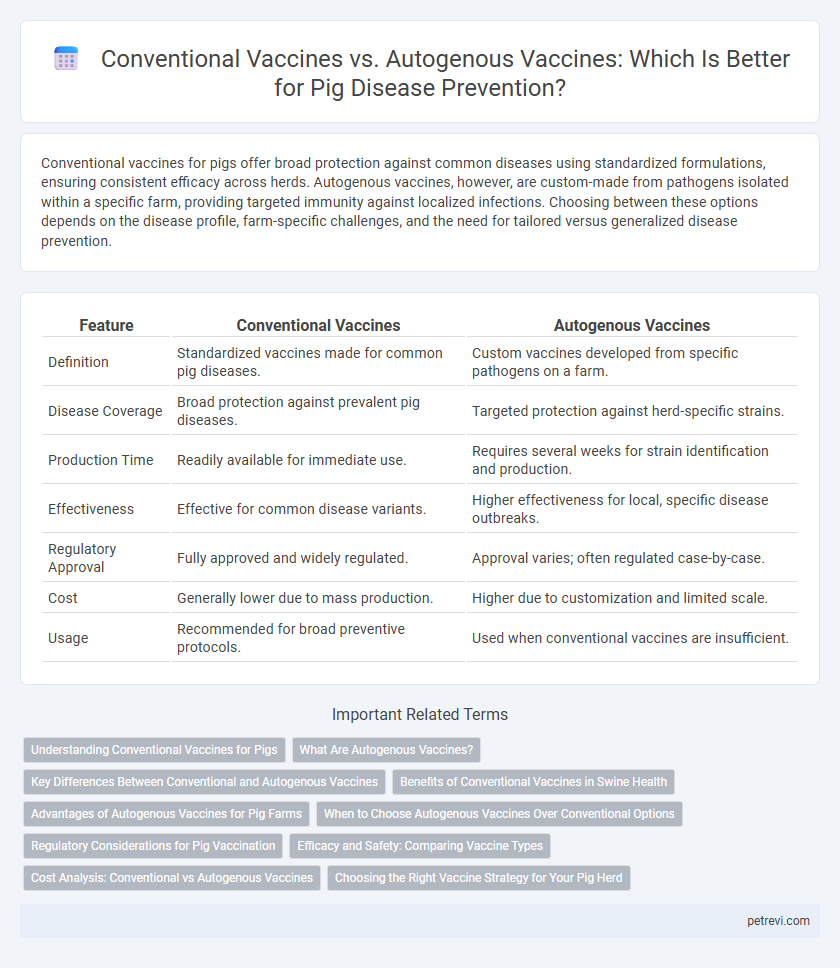Conventional vaccines for pigs offer broad protection against common diseases using standardized formulations, ensuring consistent efficacy across herds. Autogenous vaccines, however, are custom-made from pathogens isolated within a specific farm, providing targeted immunity against localized infections. Choosing between these options depends on the disease profile, farm-specific challenges, and the need for tailored versus generalized disease prevention.
Table of Comparison
| Feature | Conventional Vaccines | Autogenous Vaccines |
|---|---|---|
| Definition | Standardized vaccines made for common pig diseases. | Custom vaccines developed from specific pathogens on a farm. |
| Disease Coverage | Broad protection against prevalent pig diseases. | Targeted protection against herd-specific strains. |
| Production Time | Readily available for immediate use. | Requires several weeks for strain identification and production. |
| Effectiveness | Effective for common disease variants. | Higher effectiveness for local, specific disease outbreaks. |
| Regulatory Approval | Fully approved and widely regulated. | Approval varies; often regulated case-by-case. |
| Cost | Generally lower due to mass production. | Higher due to customization and limited scale. |
| Usage | Recommended for broad preventive protocols. | Used when conventional vaccines are insufficient. |
Understanding Conventional Vaccines for Pigs
Conventional vaccines for pigs are mass-produced immunizations designed to protect against common infectious diseases such as Porcine Reproductive and Respiratory Syndrome (PRRS), Swine Influenza, and Erysipelas. These vaccines undergo rigorous testing for safety and efficacy, providing broad immunity across diverse pig populations. Their standardized formulation ensures consistent quality and facilitates large-scale disease management in commercial swine operations.
What Are Autogenous Vaccines?
Autogenous vaccines are custom-made immunizations derived from pathogens isolated directly from a specific herd or farm, targeting local disease strains in pigs. Unlike conventional vaccines, which are mass-produced using standardized strains, autogenous vaccines provide tailored protection by addressing the unique microbial environment of a pig population. This specificity can enhance immune response effectiveness and minimize outbreaks in swine herds resistant to common vaccines.
Key Differences Between Conventional and Autogenous Vaccines
Conventional vaccines for pigs are mass-produced using standardized antigen strains targeting common pig diseases, ensuring broad-spectrum immunity and regulatory approval. Autogenous vaccines are custom-made from pathogens isolated on a specific farm, providing tailored protection against unique or emerging diseases not covered by commercial vaccines. The key differences lie in production scale, antigen specificity, regulatory requirements, and effectiveness in controlling farm-specific outbreaks.
Benefits of Conventional Vaccines in Swine Health
Conventional vaccines provide broad protection against common swine diseases like Porcine Reproductive and Respiratory Syndrome (PRRS) and Mycoplasma hyopneumoniae due to their standardized formulations. These vaccines undergo rigorous testing to ensure consistent safety and efficacy across diverse pig populations, facilitating widespread disease control. Mass production and regulatory approval make conventional vaccines cost-effective and accessible for large-scale swine health management programs.
Advantages of Autogenous Vaccines for Pig Farms
Autogenous vaccines provide targeted immunity by using pathogens isolated directly from a specific pig herd, enhancing effectiveness against localized disease strains. These vaccines reduce the risk of adverse reactions and improve herd health by addressing unique farm-specific pathogens. Custom formulation of autogenous vaccines supports better disease control and biosecurity compared to conventional vaccines in pig farming.
When to Choose Autogenous Vaccines Over Conventional Options
Autogenous vaccines are ideal when conventional vaccines do not exist for specific pathogens or when a farm experiences unique disease outbreaks caused by strains not covered by standard vaccines. They provide targeted immunity by using pathogens isolated directly from the affected swine herd, enhancing protection against site-specific infections. Choosing autogenous vaccines is crucial during outbreaks of emerging diseases or antibiotic-resistant strains where conventional options fail to provide adequate control.
Regulatory Considerations for Pig Vaccination
Conventional vaccines for pig disease prevention undergo strict regulatory approval processes to ensure safety, efficacy, and quality, complying with guidelines from agencies like the USDA or EMA. Autogenous vaccines, produced from pathogens isolated on individual farms, face a different regulatory framework that often allows faster deployment but requires veterinary oversight and specific manufacturing controls. Both vaccine types must meet stringent standards to minimize disease outbreaks and ensure herd health while adhering to regional legislation governing veterinary biologics.
Efficacy and Safety: Comparing Vaccine Types
Conventional vaccines for pigs are standardized and widely tested, offering consistent efficacy against common diseases such as Porcine Reproductive and Respiratory Syndrome (PRRS) and Swine Influenza, with established safety profiles monitored by regulatory agencies. Autogenous vaccines, customized from pathogens isolated within a specific herd, provide targeted immune protection and are particularly useful in managing unique or emerging disease strains, but their efficacy and safety depend heavily on the quality of the pathogen selection and vaccine production process. While conventional vaccines benefit from broad safety data, autogenous vaccines require careful monitoring to avoid adverse reactions, making both options critical tools depending on the herd's health status and disease challenges.
Cost Analysis: Conventional vs Autogenous Vaccines
Conventional vaccines typically offer lower upfront costs due to mass production and wide availability, making them cost-effective for common pig diseases. Autogenous vaccines, although more expensive per dose, provide targeted immunization tailored to specific herd pathogens, potentially reducing overall treatment and loss expenses. Evaluating cost-effectiveness requires factoring in disease prevalence, vaccine efficacy, and long-term health management outcomes in swine production.
Choosing the Right Vaccine Strategy for Your Pig Herd
Conventional vaccines provide broad protection against common pig diseases with established safety profiles, making them suitable for large-scale herd applications. Autogenous vaccines are custom-made from pathogens isolated directly from your herd, offering targeted immunity against specific local disease strains and reducing outbreak risks. Selecting the right vaccine strategy depends on factors like herd health history, prevalent pathogens, production goals, and veterinary guidance to optimize disease prevention and maximize herd productivity.
Conventional vaccines vs Autogenous vaccines for Pig disease prevention Infographic

 petrevi.com
petrevi.com